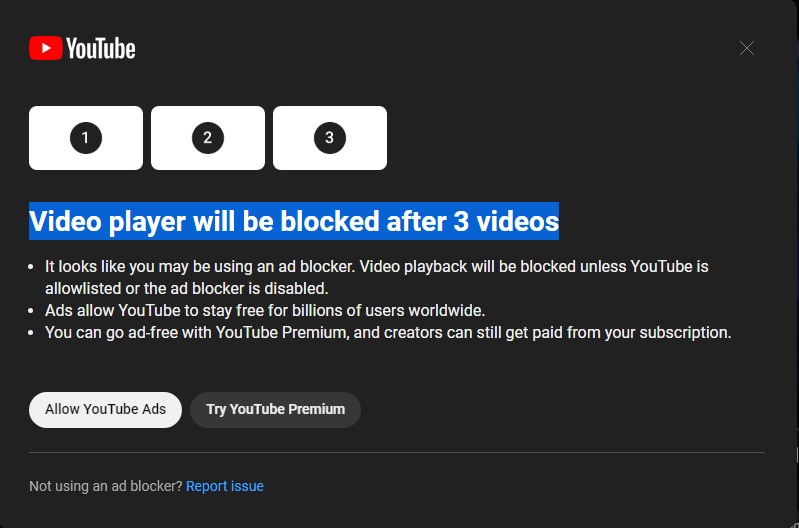
What you need to know
- YouTube appears to be testing cutting users off after watching videos with ad blockers enabled.
- A popup asks viewers to disable ad blockers or subscribe to YouTube Premium as part of the experiment.
- The video player will be blocked if three videos have been watched while an ad blocker is active.
YouTube may unsurprisingly become more aggressive in its fight against ad blockers, with the platform apparently testing cutting viewers off after watching three videos while an ad blocker is running.
A Reddit user spotted the experiment and shared a screenshot of what looks like a three-strikes policy (via Android Authority). This means that when you're using an ad blocker, a popup will interrupt your viewing and prompt you to switch off your browser's ad blocker. Otherwise, you'll be blocked from watching more than three videos.
YouTube confirmed to The Verge that it is conducting a limited experiment with users around the world in order to force them to allow ads on YouTube or subscribe to YouTube Premium. If you've been falsely identified as using an ad blocker, you can report the incident by clicking on a link in the popup.

To get its message across, YouTube is also said to be notifying users via email that they may lose access to YouTube videos if they continue to use ad blockers.
Google's war on ad blocking is not entirely new. For years, the search giant has been cracking down on users hell-bent on evading ads on YouTube. Early last year, the YouTube Vanced app was forced to shut down after a legal threat from Google. The app allowed YouTube users on Android to block video ads even without a Premium subscription.
In the same year, the Mountain View-based company also banned many Android VPN apps that caused disruption on advertising operations, unless they used the VPNService API.
At the moment, the new policy does not appear to target every ad blocker on the market. According to a few Redditors who use uBlock Origin, the popup does not show up for them.
It's safe to assume that some ad-blockers are not blacklisted for the time being, as the policy is said to be in testing. In any case, we can count on Google expanding that list once the three-strikes policy becomes public.







